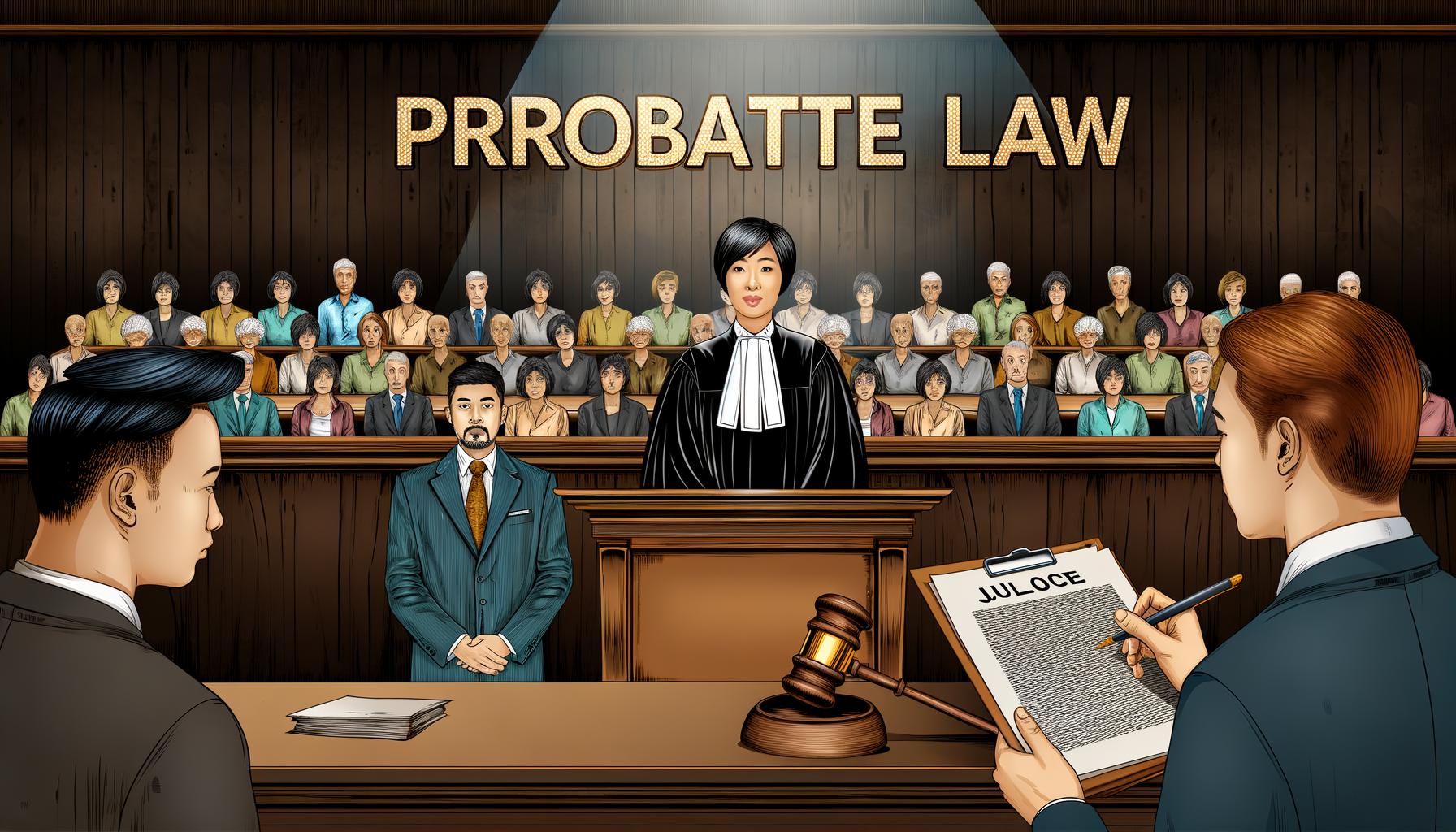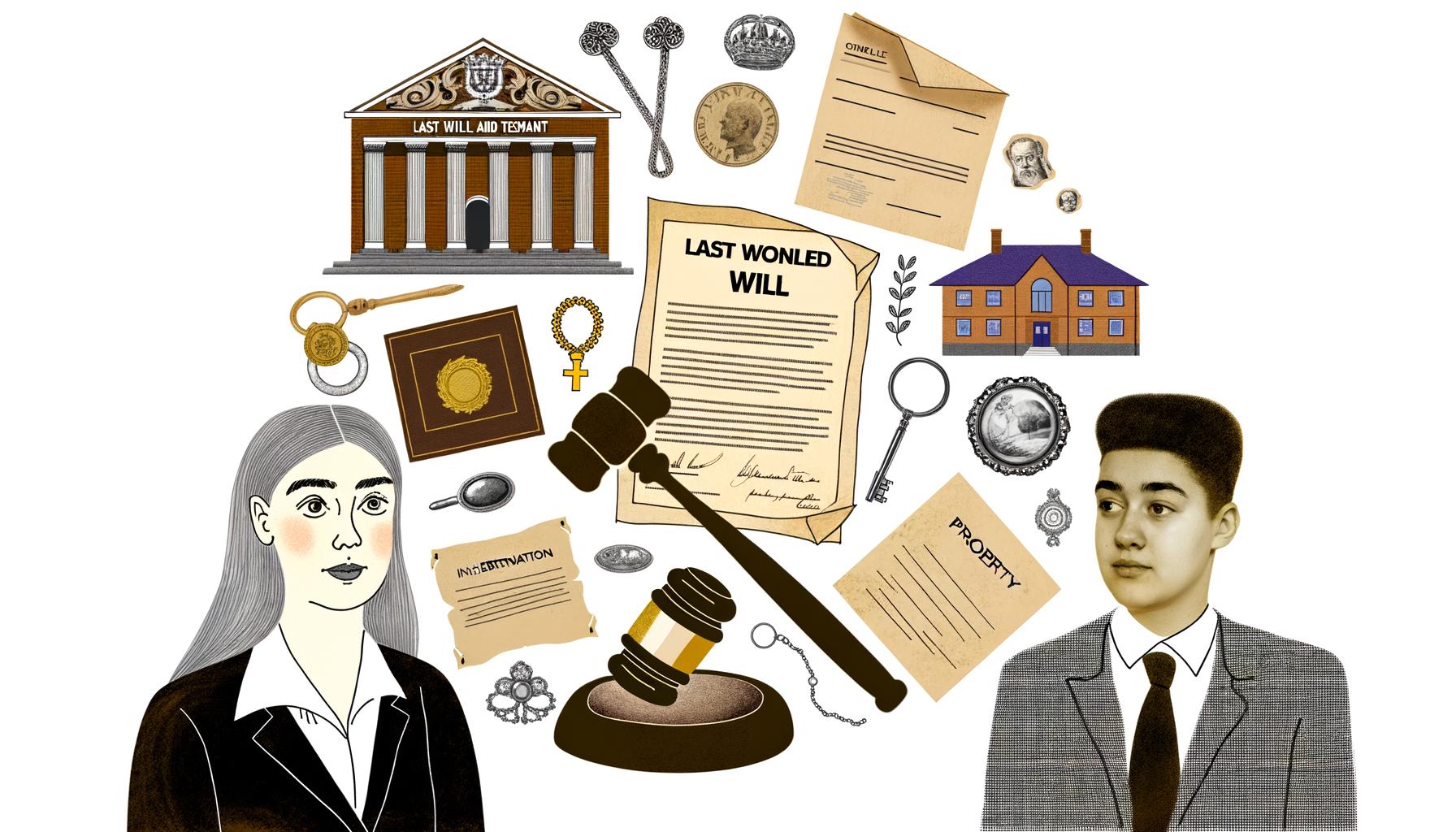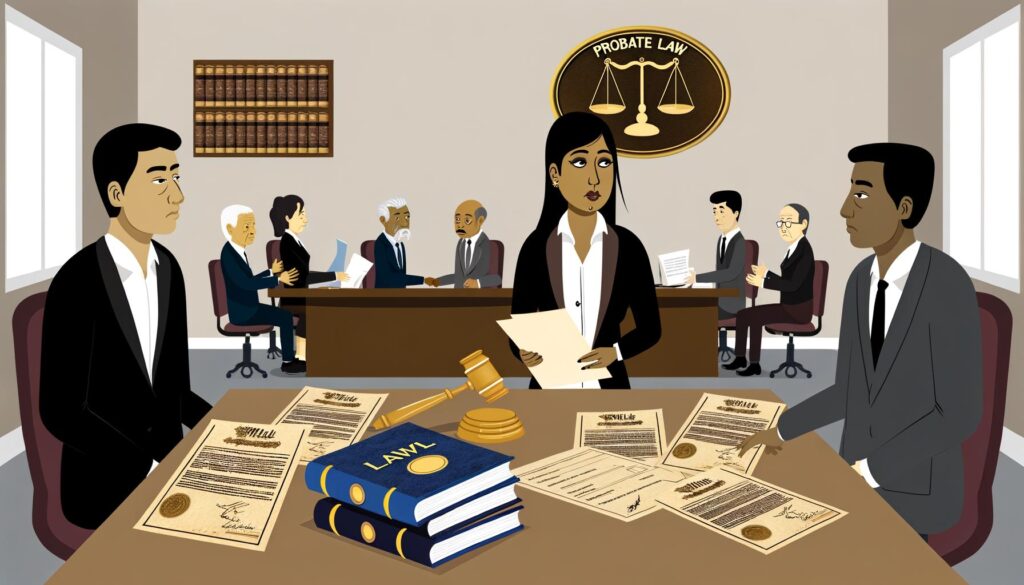Probate law plays a crucial role in managing the complexities that arise after a loved one passes away, ensuring that their assets are distributed according to their wishes. For families in Villa Park, understanding the nuances of probate law can alleviate significant stress and confusion during such a challenging time. This article aims to shed light on key aspects of probate law, offering valuable insights for Villa Park families navigating this intricate legal landscape.
Probate is the legal process through which a deceased person’s estate is administered, debts are settled, and remaining assets are distributed to heirs or beneficiaries. The primary purpose of this process is to provide an orderly method for carrying out the decedent’s wishes as stipulated in their will or, if no will exists, according to state laws of intestacy. By familiarizing themselves with these procedures, Villa Park families can ensure that estates are managed efficiently and equitably.
For residents of Villa Park, probate law holds particular importance due to various local regulations and practices that may impact the administration of estates. From initial filings and asset appraisals to debt settlements and final distributions, each step in the probate process requires careful attention to detail. Whether dealing with formal or informal probate proceedings, knowing what to expect can help families make informed decisions and avoid common pitfalls associated with estate administration.
Steps in the Probate Process
When engaging with the probate process, it is crucial to understand its sequential steps. The first step involves the initial filing and notification. Typically, the executor of the estate, as named in the will, files a petition with the local probate court to open the probate case.
This petition not only initiates judicial oversight but also includes official notifications to all beneficiaries and heirs listed in the will, as well as known creditors of the deceased. In Villa Park, this step ensures transparency and provides an opportunity for any objections or claims to be raised early in the process.
Following notification, there is an inventory and appraisal of assets phase. The executor is required to compile a comprehensive list of all probate assets owned by the decedent at their time of death. These assets can range from real estate properties to financial accounts and personal belongings.
Each item must be appraised to determine its current market value. This detailed inventory helps ascertain the total worth of the estate and can influence subsequent phases such as debt repayment and tax calculations, which are integral parts of probate law compliance.
The next stage involves settling debts and taxes owed by the estate. Executors must address any outstanding liabilities including household bills, personal loans, credit card debts, and medical expenses incurred prior to death.
Additionally, they must calculate and pay any federal or state taxes due on behalf of the estate. Ensuring these financial obligations are met accurately protects against future legal challenges from creditors or tax authorities, thereby smoothing out potential setbacks before reaching one of the most awaited steps – distributing remaining assets to rightful heirs.
| Step | Description |
|---|---|
| Initial Filing & Notification | Executor files a petition with court; notifications sent to beneficiaries & creditors. |
| Inventory & Appraisal | Compiling and valuing all estate assets. |
| Settlement of Debts & Taxes | Paying off debts & fulfilling tax obligations. |
Types of Probate
Understanding the differences between formal and informal probate is crucial for Villa Park families navigating probate law. Formal probate requires court supervision throughout most of the process, which can provide an added layer of security and oversight.
This type usually involves court hearings where a judge resolves any disputes and supervises key actions such as the sale of assets or distribution of the estate. It’s often chosen when there are significant assets involved, numerous creditors, or potential conflicts among heirs that require judicial intervention.
In contrast, informal probate offers a streamlined process with minimal court involvement. This option is typically quicker and less costly because it mostly avoids courtroom procedures. An appointed personal representative can manage the estate more autonomously, making it suitable for smaller estates with clear-cut wills and agreeable beneficiaries. However, this simplicity means there’s also less legal protection against potential disputes or claims against the estate.
Before deciding between formal and informal probate, several factors must be assessed:
- Complexity of the Estate: Larger estates with multiple assets like real estate or business interests often benefit from formal probate.
- Potential for Disputes: If there are likely disagreements among heirs or ambiguity in the will’s language, formal probate provides judicial oversight.
- Estate Value: Smaller estates without complexities may opt for informal probate to avoid unnecessary expenses.
- State Requirements: Villa Park families should check Illinois state laws as they may dictate specific conditions under which either type is permissible.
Choosing which route to take necessitates careful consideration of these factors and consulting with a qualified attorney experienced in probate law can offer families tailored advice based on their unique circumstances.

Role of the Executor
Duties and Responsibilities of the Executor
The executor plays a crucial role in navigating probate law. They have the responsibility to ensure that the deceased’s estate is managed and distributed according to their will or, in the absence of a will, per state laws.
Initially, the executor must locate and file the decedent’s will with the local probate court. Following this, they’ll need to secure all assets listed and begin an inventory process that details every item within the estate, both tangible and intangible.
One of their significant duties includes notifying creditors and paying any outstanding debts or taxes owed by the estate. This step is essential as failing to properly address debts can lead to legal complications or potential liabilities for themselves or beneficiaries. Once all debts and taxes have been paid, and after receiving approval from the court, executors can proceed with distributing the remaining assets to rightful heirs as dictated by the will or governed by state intestacy laws.
Choosing the Right Executor
Choosing an appropriate executor can make a profound difference in how smoothly or contentiously your estate is settled. Ideally, you’ll select someone who is trustworthy, organized, and has a clear understanding of fiduciary duty. For Villa Park families, it might be practical to choose someone who resides locally given geographic proximity can simplify meetings with relevant parties such as attorneys or financial institutions.
Moreover, while it’s common for people to appoint close family members as executors due to trust factors, it’s vital also to gauge their capability under stressful conditions when grieving might affect judgment. In some cases-particularly if family dynamics are complex-a neutral third party like a professional trustee or an experienced attorney well-versed in probate law may prove beneficial.
Legal and Ethical Considerations
Executors are bound by a fiduciary duty which obligates them to act in the best interest of both creditors and beneficiaries while abiding strictly by probate law regulations. This means maintaining transparency through detailed records of financial transactions involving estate assets so that actions cannot be contested later on grounds like mismanagement or fraudulence.
Ethically speaking as well as legally mandated; an executor should avoid conflicts of interest-situations where personal benefit could conflict with duties-by stepping aside if there arises even an appearance thereof. In addition maintaining ongoing communication using formal channels helps preclude misunderstandings about procedural developments thus preventing possible intra-family disputes during emotionally sensitive times invariably associated posthumously administering loved one’s worldly possessions.
Avoiding Common Probate Pitfalls
Probate law can be complex, and navigating the probate process without falling into common pitfalls requires careful attention and preparation. One frequent mistake is the failure to file required documentation on time. Probate proceedings involve various legal deadlines that must be met promptly. Missing these deadlines can lead to delays and additional expenses. Families need to ensure they understand timelines for filing petitions, inventories, and other critical documents to keep the process running smoothly.
Another common pitfall in probate proceedings is the mismanagement of estate assets. Executors have a fiduciary duty to manage estate assets responsibly, which includes accurately valuing and safeguarding property until it can be appropriately distributed. Missteps such as not securing valuable items, failing to maintain financial transparency, or improperly liquidating assets can lead to legal challenges from beneficiaries or creditors. Implementing a meticulous inventory system and consulting with financial advisors can help avoid these issues.
Legal challenges are also a significant concern during probate processes. Disputes over the validity of the will, allegations of undue influence, or disagreements among heirs regarding the distribution of assets are all potential hurdles that may arise. Addressing these challenges proactively by ensuring that estate planning documents are clear and legally sound can mitigate conflicts. Moreover, seeking advice from an attorney who specializes in probate law can provide valuable guidance in resolving disputes efficiently and amicably.
To help families navigate these pitfalls more effectively:
- Stay informed about key deadlines in your jurisdiction.
- Maintain thorough records of all asset valuations and transactions.
- Engage with professionals such as estate planners and attorneys early in the process.
By taking these precautions, families in Villa Park can significantly reduce complications during probate proceedings and ensure a smoother transition of their loved ones’ estates.

Probate and Estate Planning
Estate planning serves as a foundational element in streamlining the probate process. For Villa Park families, thorough estate planning can mean the difference between a lengthy, complicated probate ordeal and a more manageable, efficient experience.
Essential tools like wills and trusts are vital in laying out clear instructions on asset distribution, thus minimizing ambiguities. A well-constructed estate plan can significantly reduce the difficulties an executor might face, ensuring that family members are not only provided for but also spared unnecessary stress.
One of the core components of estate planning is drafting a will. A clear and legally valid will stipulates how an individual’s assets will be distributed upon their death, thereby preventing disputes among heirs and simplifying probate proceedings.
Additionally, establishing trusts can prove beneficial; for instance, revocable living trusts allow individuals to retain control over their assets while alive yet ensure seamless transfer without going through probate. This simplicity is particularly useful under current probate laws which aim to minimize time-consuming legal procedures.
Consulting with an experienced estate planning attorney offers several advantages for Villa Park families navigating these processes. An attorney specialized in probate law can provide crucial guidance tailored to specific needs-whether it’s optimizing tax strategies or setting up special needs trusts for loved ones with disabilities. Early and comprehensive estate planning helps safeguard your family’s future by preempting legal challenges and providing a robust framework for asset management and distribution.
| Essential Estate Planning Tools | Benefits |
|---|---|
| Will | Clarifies asset distribution, reduces disputes among heirs |
| Revocable Living Trust | Ensures seamless transfer of assets without going through probate |
| Special Needs Trusts | Provides for loved ones with disabilities without jeopardizing benefits |
Special Considerations for Villa Park Families
Villa Park Specific Probate Regulations and Practices
Navigating probate law can be complex, and it becomes even more intricate when considering the unique regulations and practices specific to Villa Park. Local statutes may influence various aspects of the probate process, such as filing deadlines, court procedures, and documentation requirements. Understanding these localized rules is vital for preserving the estate’s value and minimizing delays.
Probate courts in Villa Park may have distinct forms or additional criteria that must be met before moving forward in the legal proceedings. It’s crucial to consult with a local probate attorney who is well-versed in these specifics to ensure compliance and streamline the entire process.
Community Resources and Support Organizations
For families in Villa Park dealing with probate processes, there are numerous community resources and support organizations available. These entities often provide legal guidance, emotional support, and financial advice during what can be a challenging time.
Non-profit organizations like local elder law centers offer workshops on estate planning and understanding probate law, easing some of the burdens associated with managing an estate. Furthermore, many community centers hold seminars where residents can learn about wills, trusts, and other essential topics related to managing one’s legacy efficiently within Villa Park’s jurisdiction.
Case Studies of Local Probate Scenarios
To fully grasp how probate law operates specifically within Villa Park, examining real-life case studies can be incredibly insightful. For instance, one notable case involved a family overcoming significant debt left by a deceased relative while adhering strictly to Villa Park’s probate regulations.
Through diligent asset inventorying and strategic debt settlements facilitated by a knowledgeable executor familiar with local laws, they managed to preserve much of the estate’s value for future generations. Another scenario highlighted how utilizing community resources aided families who initially found themselves overwhelmed by legal complexities but successfully navigated their way through probate proceedings with expert assistance from local attorneys.
Understanding these unique considerations is indispensable for any family in Villa Park dealing with the intricacies of probate law. Armed with proper knowledge about local regulations, community resources, and practical examples from past cases will undoubtedly position them better for navigating this inherently complex legal landscape effectively.
The Future of Probate Law
Probate law is continually evolving, influenced by legislative changes, societal shifts, and advancements in technology. One of the recent notable changes involves the push towards a more digital probate process. As courts recognize the convenience and efficiency offered by electronic documentation and digital signatures, many jurisdictions are starting to incorporate these tools into their procedures. This trend not only speeds up the proceedings but also reduces administrative burdens for families navigating probate.
Emerging technologies such as blockchain and artificial intelligence (AI) also hold the potential to revolutionize probate court systems. Blockchain’s secure and transparent nature can enhance the verification of wills and asset ownership records, potentially reducing disputes during probate proceedings.

Additionally, AI can assist in automating routine tasks involved in probate administration, such as tracking deadlines, managing notifications, or even helping assess compliance with legal requirements. These technological advancements could help Villa Park families handle their probate cases more smoothly while minimizing errors.
To prepare Villa Park families for these future changes in probate law, it is crucial to stay informed about new developments through reliable sources like local attorney consults or community workshops on estate planning. Furthermore, embracing emerging technologies now-such as creating digital versions of essential documents or familiarizing oneself with online platforms used by the courts-can ensure a more seamless transition when these innovations become standard practice in the future.
Adopting proactive measures today helps safeguard your family’s interests against impending legal transformations.
Conclusion
In conclusion, understanding probate law is crucial for families in Villa Park who wish to ensure a smooth transition of their loved ones’ assets and avoid potential legal complications. Probate involves several steps, from initial filing and notification to the final distribution of assets, and can vary significantly between formal and informal proceedings. Each approach has its own set of advantages and disadvantages, which families must consider carefully to determine the most suitable type for their specific situation.
The role of the executor is another pivotal aspect, as this individual shoulders significant responsibilities in managing the estate through the probate process. Selecting an appropriate executor requires thoughtful consideration of both legal expertise and personal trustworthiness.
Common pitfalls such as mismanagement of assets or failure to address legal challenges can be avoided by seeking professional guidance from attorneys specialized in probate law. Moreover, proactive estate planning using tools like wills and trusts can greatly simplify probate procedures, sparing families unnecessary stress during challenging times.
For Villa Park families, staying informed about local probate regulations and utilizing community resources can provide additional support. As probate law continues to evolve with emerging technologies and legislative changes, being prepared for future developments is essential.
Through regular consultations with estate planning attorneys and staying current with legal trends, Villa Park residents can safeguard their family’s financial well-being effectively. For further exploration into this topic, numerous resources are available that delve deeper into each area discussed here, helping families navigate the complexities of probate law with greater confidence.
Frequently Asked Questions
What Is the Probate Process in California?
In California, the probate process begins when an executor or a relative of the deceased files a petition with the court to open a probate case. The court will appoint an executor or administrator to manage the estate, which involves gathering assets, paying debts and taxes, and distributing the remaining property according to the will or state law if there is no will.
The process is overseen by a judge and can take several months to years, depending on the complexity of the estate.
Why Do I Need Probate?
Probate is needed primarily to ensure that the decedent’s assets are properly managed and distributed in accordance with their last wishes or state law. It provides legal clarity and official validation of a will, helping prevent disputes among beneficiaries.
Probate also ensures that any debts owed by the deceased are settled before inheritance distributions occur. Without probate, there could be significant legal confusion regarding asset ownership and beneficiary rights.
What Is the Probate Law in the United States?
Probate law in the United States governs how an individual’s estate is managed and distributed after their death. Each state has its own specific laws and procedures for probate, but they generally involve validating wills, appointing executors or administrators, inventorying assets, paying obligations such as debts and taxes, and distributing remaining assets to beneficiaries.
Federal law may intersect with probate concerning tax issues but otherwise leaves most matters to state jurisdiction.
How Do I Avoid Probate in California?
There are several strategies to avoid probate in California, including setting up trusts where assets can be placed outside of one’s estate for distribution upon death without going through probate court. Joint ownership with rights of survivorship allows surviving co-owners automatic inheritance of jointly owned properties without probate.
Additionally, establishing payable-on-death (POD) accounts for financial holdings like bank accounts allows direct transfer upon death.
Do All Wills in California Have to Go Through Probate?
Not all wills in California have to go through probate as some estates may qualify for simplified processes if they meet certain criteria concerning value thresholds or asset types typically considered small estates under California law.
For instance, if total real property value is below $166,250 (as of 2021), it might only require filing certain forms rather than full probate proceedings allowing faster execution without comprehensive court supervision.

